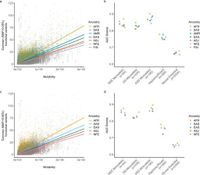As genetic research continues to evolve, a comprehensive new study published on March 18, 2025, in Nature Communications sheds light on the significance of ancestral diversity in genomic databases. By analyzing whole-exome sequencing data from over 460,000 UK Biobank participants and nearly 126,000 individuals from the Genome Aggregation Database (gnomAD), researchers found that increasing ancestral representation markedly enhances the predictive power of key intolerance metrics used to detect regions of the human genome that are sensitive to variation.
The study primarily explored several intolerance metrics, including the Residual Variance Intolerance Score (RVIS), Missense Tolerance Ratio (MTR), and Loss-of-Function Observed/Expected ratio (LOF O/E). These metrics measure how variations in the genome correspond to disease risks. Highlighting the importance of diverse ancestry, the research demonstrated that scores developed using genetic data from African and Admixed American populations exhibited superior resolution for identifying genes linked to neurodevelopmental disorders compared to those created exclusively from European ancestry individuals. This suggests that the current reliance on a predominantly European genetic pool may inhibit our understanding of genetic diseases that affect various populations.
This research underscores a critical finding: the MTR metric trained on a diverse ancestry cohort of 43,000 individuals displayed greater predictive ability than one based on nearly 440,000 non-Finnish European exomes. The analysis revealed a substantial 1.8-fold increase in common missense variants found in the African ancestry cohort, which included over 141,000 variants from just over 8,000 participants. In comparison, the non-Finnish European cohort had approximately 79,200 variants from over 56,000 individuals.
The implications of these findings extend beyond mere statistics. They suggest that prior assessments of genetic variation may have overlooked critical insights pertinent to non-European ancestries, risking health disparities in precision medicine and drug discovery. Populations with richer ancestral backgrounds often have unique genetic interpretations of disease mechanisms, which may enhance therapeutic efficacy when integrated into clinical frameworks, thereby supporting a more equitable outcome across diverse groups.
According to the authors of the article, “This study illustrates how increasing ancestral representation improves the resolution of key intolerance metrics.” In practical terms, this means that by analyzing a broader range of genetic backgrounds, researchers could refine their understanding of genetic diseases, streamline diagnostics, and identify new therapeutic targets that cater to a diverse ecosystem of human biology.
One of the most significant outcomes of the study is its reinforcement of the FDA’s recent guidance on Diversity Action Plans, which highlights the necessity to include underrepresented populations in clinical trials. This trend is crucial for generating more generalized and applicable results, which potentially leads to breakthroughs that can benefit all segments of the population.
In summary, this research advocates for enhanced representation from various ancestral groups in genomics. As the volumes of sequencing data increase, ensuring equitable representation becomes ever more vital—not just for ethical reasons but to maximize the potential of medical advancements stemming from genetic research. The findings contribute to the ongoing dialogue on health equity, emphasizing that more comprehensive genetic datasets are essential for understanding human diversity and improving healthcare on a global scale.
To access the ancestry group-specific scores, individuals can explore an interactive portal established by the researchers, which further opens the pathway for collaborative exploration in genomic research.

